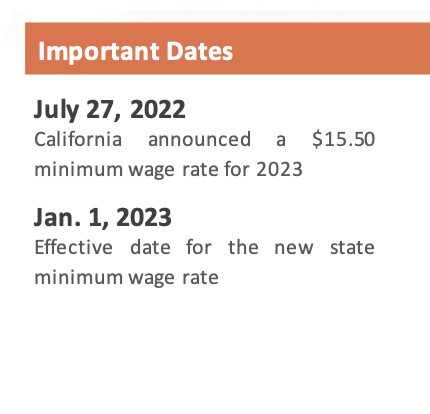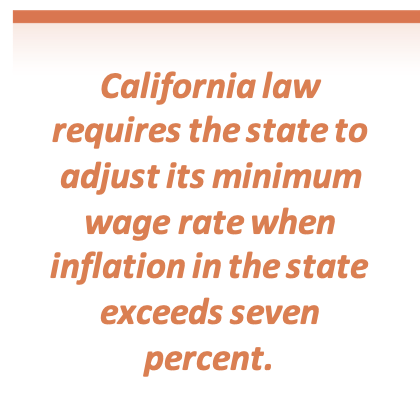The California Department of Industrial Relations has announced that the state hourly minimum wage will increase to $15.50 an hour on Jan. 1, 2023. The new rate will apply to all employers, regardless of how many individuals they employ.
California’s Minimum Wage Rate
In 2016, California decided to increase the state’s hourly minimum wage rate to $15 per hour by 2023. To facilitate this increase, the state adopted a phase-in schedule that differentiated between employers with 25 or fewer employees and employers with 26 or more employees, but ultimately allowed all employers in the state to reach the $15 minimum wage rate gradually.
The schedule was set to expire and establish the state’s $15 minimum wage rate on Jan. 1, 2023. However, Labor Code section 1182.12(c)(3)(A) also requires the state to adjust its minimum wage rate when inflation in the state exceeds 7%. As a result, on July 27, 2022, California’s Department of Finance certified that based on the annual inflation rate from July 1, 2021, to June 30, 2022, the state minimum wage must increase from $15 to $15.50 an hour for all employers.
 Impact on Employers
Impact on Employers
California employers update their payroll processes and procedures to comply with the new minimum wage rate by Jan. 1, 2023.

This minimum wage increase will also affect the salary requirements for exempt executive, administrative and professional (EAP) employees. Under Labor Code Section 515(a), EAP employees qualify for an overtime exemption if, among other things, they “earn a monthly salary equivalent to no less than two times the state minimum wage for full-time employment.” This means that by Jan. 1, 2023, these employees must receive an annual salary of at least $64,480 annually or $1,240 weekly to qualify for this exemption.

